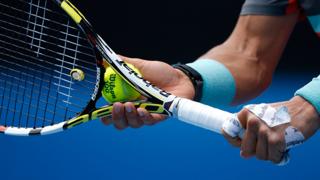
Tennis officials will carry out an independent review into their anti-corruption practices after the sport was hit with claims of match-fixing.
The announcement at the Australian Open follows a BBC and BuzzFeed News investigation that revealed suspected illegal betting in tennis over the past decade.
Files showed that over the past 10 years, 16 players who have ranked in the top 50 have been repeatedly flagged to the Tennis Integrity Unit (TIU) over suspicions they have thrown matches.
All of the players, including winners of Grand Slam titles, were allowed to continue competing.
The review is “aimed at further safeguarding the integrity of the game,” said a joint statement from the ATP, WTA, International Tennis Federation (ITF) and heads of all four Grand Slams.
They also called for all governments worldwide to make fixing a criminal offence.
Wimbledon chairman and head of the sport’s integrity board Phillip Brook said: “It is vital we repair the damage and do so quickly.
“We are determined to do anything we need to to remove corruption from our sport.”
He added: “Certainly the events of the past 10 days have caused damage to our sport.
“We remain totally confident in the work of the Tennis Integrity Unit. However, it is really important we conduct this independent review in order that everyone who loves our sport and watches our sport is confident that we are doing all we can do make sure the integrity of the sport is maintained.”
Asked about the BBC/BuzzFeed investigation, Brook said: “I was disappointed in the programme. I don’t think we felt it revealed anything new.”
ATP chairman Chris Kermode said: “We are in a toxic environment for sport at the moment. It’s an easy target for people to have a go with recent allegations about other governing bodies.
“We want to be as open and transparent as possible to demonstrate that we will look at this thoroughly. There is a zero, zero tolerance for this in our game.”
Kermode added: “Having lists of suspicious betting patterns do not mean corruption. They are a red flag and that is not evidence.”
What will the review look at?
BBC Radio 5 live tennis correspondent Russell Fuller, in Melbourne, Australia:
“The independent panel will report on the effectiveness of the Tennis Anti-Corruption Programme and make recommendations for change.
“The panel has been asked to look into how the TIU can become more transparent without compromising the need for confidentiality. It will also consider additional resources for the TIU and structural changes that may enhance its independence.
“It will also examine whether the scope and reach of the tennis integrity education programme should be extended.
“The sport’s governing bodies have committed to making the recommendations of the review panel publicly available and to implement them all in full.”
What were the allegations?
Documents showed a 2007 ATP investigation into suspicious betting activity around one game cleared both payers but developed into a wider inquiry.
It found betting syndicates in Russia, northern Italy and Sicily making hundreds of thousands of pounds betting on matches that investigators thought to be fixed. Three of these matches were at Wimbledon.
In a confidential report for the tennis authorities in 2008, the inquiry team said 28 players involved in these matches should be investigated, but the findings were never followed up.
Tennis introduced a new anti-corruption code in 2009 but after taking legal advice were told previous corruption offences could not be pursued.
How are matches fixed?
According to an anonymous ex-tennis player from South America, “three big groups” control betting in tennis and that any payments to players are made using cash, with no bank-to-bank transfers allowed.
He said each group has “many guys inside the circuit” and 50-60 accounts where dozens of small bets are placed to make “really big” money.
“This is like a secret on the tour that everybody knows, but we don’t talk about it,” said the player, whose identity is known by the BBC. “We just see it and keep working.”
But the TIU said it rejects “any suggestion that evidence of match-fixing has been suppressed”.



